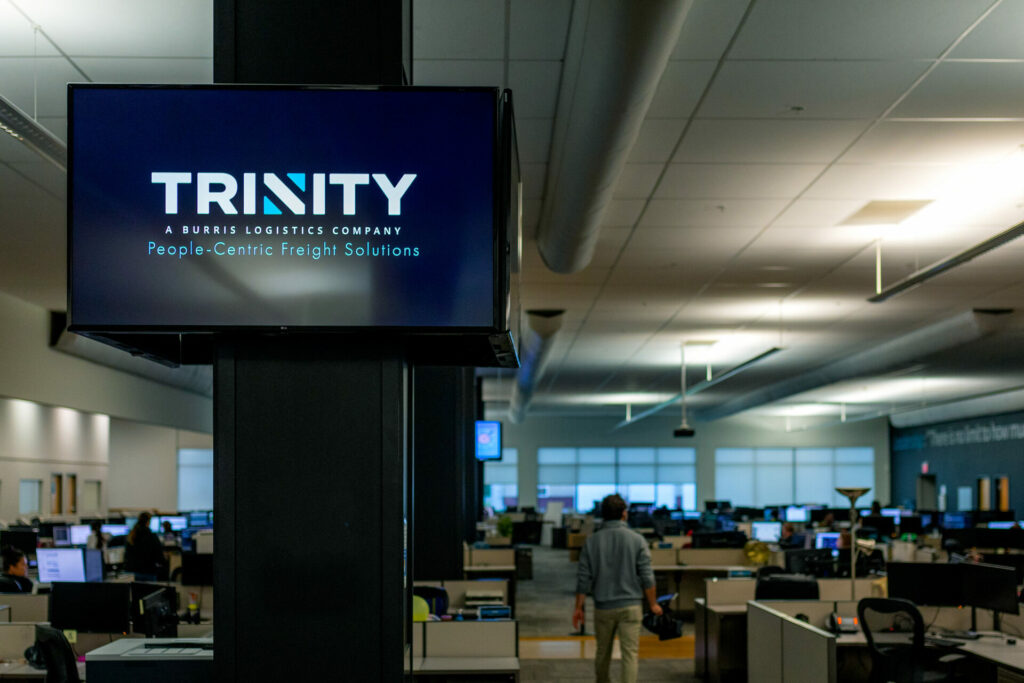Trinity Logistics, founded in 1979, is a self-described “people-centric freight solution company.” With over forty years in the industry, it has made quite the name for itself in the freight distribution industry, by constantly improving and generating creative freight solutions that service both its shippers and carriers equally.
What sets Trinity Logistics apart as a freight distribution company is its non-asset-based business model. With this model, Trinity can offer a full suite of services to their shipping customers, from shipping one pallet of product all the way to freight movement even outside of the domestic US. Trinity also has a Managed Services team to assist in the management of a company’s entire transportation needs, from software as a service to fully outsourced management of a construction company’s transportation. Trinity values understanding its shipping customers and coming up with creative solutions with the technological resources and years of experience that everyone on its team has amassed.

Trinity has found its niche as a company where ‘People are our biggest resource’ as said by Greg Massey, Senior V.P of Agent Development in Trinity Logistics. The team at Trinity Logistics is not limited by a particular carrier or any group of carriers, they are able to utilize a vast network of carrier partners, from owner operators to multi-truck fleets. This style of distribution network allows the company to find just the right equipment for the unique needs of its shipping partners. Since quite a few of its shipping customers require specialized equipment, Trinity Logistics has established great professional relationships with these customers by satisfying these needs throughout its rich and successful history in the industry.
For Trinity Logistics, the three pillars of efficiency in distribution are data, communication, and people. The company has invested in data gathering and modelling tools and as such, it has access to real time information on transit times, equipment requirements and available stock, all of which aids the efficiency of its business. Communication, the second pillar, means that Trinity is laser-focused on its customers and their needs, shippers, and carriers alike. Trinity’s ability to maintain good relationships allows the company to keep its networks stable and respond quickly to any disruptions or changes in the market dynamics. Finally, their ‘secret sauce’ as Mark Peterson, Senior V.P of Business Development puts it, is the people onboard. With a team that they trust and who are constantly improving, Trinity takes great care to keep its team educated and informed when launching new tools or concepts.
Trinity’s 8 Guiding Values as displayed on their website, are Teamwork, Integrity, Legacy, Leaders, Fun, Determination, Excellence and Continuous Improvement. The ways in which these values have contributed to Trinity’s success are numerous, as Sarah Ruffcorn, President at Trinity Logistics assures me, these values are not just something that ‘they hang on the wall’. For those at Trinity, these values are so important that they reward the individuals who represent them, daily, monthly, and annually. By rewarding the team members who represent these values, the company has been rewarded, with multiple workplace awards over the years. These awards have then allowed Trinity to take on even more talented individuals who then go on to serve their shippers and carriers and sustain the cycle of excellence.
Just some of the awards that have allowed it to do this are being among the Top 20 Freight Brokerages in Transport Topics Top 100 Freight Brokerages, a Top 3PL and Cold Storage Provider by Food Logistics, and a Certified Great Place to Work ®. To Trinity, these awards mean a lot, both to its internal and external audience. Internally, they provide a source of pride and motivation for the team. Externally, it provides well-deserved recognition and an endorsement to potential future partners.
“Trinity’s 8 Guiding Values as displayed on their website, are Teamwork, Integrity, Legacy, Leaders, Fun, Determination, Excellence and Continuous Improvement.”
Furthermore, Trinity Logistics has been recognized as one of the Healthiest 100 Workplaces in America, a high accolade that the company goes to great lengths to maintain. It endeavors to serve both the team’s personal and professional needs. This is evident throughout the company, from its wellness programs and quarterly wellness challenges that team members are encouraged to take full advantage of, as well as providing annual lab-work programs, on-site gyms, and a brand-new initiative called the Healthy Mind Healthy Body initiative. Trinity also has the SmartDollar program for their employees to aid financial wellness, and a robust EAP program that includes mental health counselling and partnerships with marketplace chaplains from the spiritual wellbeing perspective.
Amongst the companies with which Trinity Logistics has great professional relationships, a third of its business coming from the construction sector stands out. The reason why so much of their business is with the construction sector is because of the teams’ extensive knowledge in that area, specifically the flatbed type of freight movement that this sector favors. As Greg Massey puts it, “it’s not the kind of knowledge that just anyone can come into the industry and have, so employing the right team and then putting them in contact with the right customers makes all the difference.” Consistent delivery of the services that these companies need is also what keeps these clients, many of which are independent businesses, working closely with Trinity. Trinity’s relationship with small businesses, as well as successful ongoing relationships with its carrier partners, makes the entire extended netowrk one of massive opportunity and mutual support. This system, which Greg Massey refers to as a ‘3-legged stool’ in which all parties are equally reliant on each other and uplift each other, keeps their businesses thriving.
Thanks to the kinds of relationships that Trinity has forged over many years in business, they’ve experienced between 120% and 130% volume growth. This remarkable feat is something which they credit, not only to their relationships, but to serving well and consistently. Between its range of mode services as well as its technology services offerings, the company aims to always support its shippers’ goals, with low, quick-pay fees. All of this is what Trinity credits to its significant success, especially in recent years.
When asked more specifically what aspects of the business model they felt contributed most heavily to their success, those at Trinity ultimately believe it comes down to a sense of purpose in its business. As a company consistently striving to improve people’s lives with its services, there is an undeniable efficiency and sense of urgency in achieving these goals. Within that, the company has a drive for service excellence and continuous improvement, and in their own words, they never stand still. This is a company that is self-confessed in constantly looking for ways to help its shippers’ businesses succeed, as well as their carriers. This is achieved by striving to put them first, always connecting them with the right people, and meeting their goals and needs in the most efficient way it can. As Mark Peterson puts it, they’re never just in business ‘for today or tomorrow’ but for the long haul.
In terms of their future, in short, Trinity Logistics sees its future as ‘super bright’. Having been acquired just a few years ago by Burris Logistics, the team and its abilities have expanded and will continue to do so in the years that follow. For them, the goal is to maintain consistency, flexibility, and their incredible professional relationships.






















